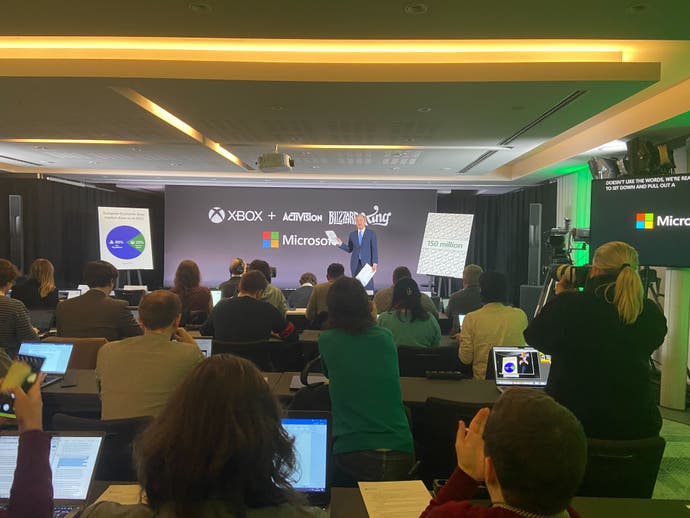Without Sony on board, Microsoft's dual announcements felt like a sandwich without the filling
"We're ready to sit down and pull out a pen, or a version of Microsoft Word."
Today in Brussels, I watched Microsoft president Brad Smith produce a copy of the agreement he still hopes Sony will sign: a contract to keep Call of Duty on PlayStation and remove the concerns of Xbox's biggest rival from blocking its $68.7bn Activision Blizzard buyout.
But even as the Microsoft exec waved his piece of A4 aloft, Sony's disagreement over the deal remained a major sticking point in getting the acquisition past regulators here in Europe, in the UK, and in the US.
And despite my summons by Microsoft to Brussels - the site of a meeting today between it, the EU, Sony and other interested partners - for an update on the deal, I was left with a feeling we'd been fed a sandwich of agreements which seemed like bread with little filling.
This morning, Microsoft reiterated what we essentially knew already - that Nintendo, through lack of interest or genuine optimism at getting Call of Duty on its hardware - was not going to be an issue to Xbox getting its deal done.
This evening, journalists were told that Nvidia, the company behind Microsoft's PC cloud gaming rival, had also been brought on board. In total, Smith said, that meant 150m more devices now had access to Call of Duty.
But what about this afternoon? What about Sony? When pressed on how the meeting with PlayStation boss Jim Ryan had gone, Brad Smith declined to go into real detail.
Instead, we got that flourish of a contract: unsigned, hopeful, expectant. Was today meant to convince Sony that, with Nintendo and Nvidia on board, its own acceptance of the deal was now inevitable? To be fair, it always seemed unlikely today's meeting between Xbox and PlayStation would result in a breakthrough.
Was today instead meant to convince the EU's European Commission and other hesitant regulators that Microsoft's deal was a foregone conclusion? To me, Brad Smith's remarks ultimately suggested Microsoft saw the deal as another in a long line of deals it has gotten through regulators regarding its PC business in the past.
In a briefing ripe with repeated statements that it was a minority in the console space - to a ratio of 80:20 in Europe, a projected pie chart prominently showed - Microsoft simultaneously extolled its experience and determination to get this deal done, belying its bid to appear as a billionaire underdog.
"At Microsoft we have deep and long experience in complying well with the kinds of remedies which make sense in this case," Smith said. "The kinds of remedies that ensure Call of Duty remains available on other consoles. The kind of remedies that can ensure Call of Duty and other games remain available in the cloud and even on alternative operating systems like ChromeOS and for Chromebooks. We came to Brussels ready to roll up our sleeves and make that kind of solution work, because we know that's what it will take to grow this market further."
"I walk around with an envelope containing that contains the definitive agreement we sent to Sony two days before Christmas."
The theatrics of that contract, of this entire day, pointed to a company which believes it will still win out, while promoting a cross-platform future it will own a bigger part of. Even the hardline stance of the UK's Competition and Markets Authority that suggested structural change to the deal was necessary - meaning Microsoft must check its ambitions and give up at least one piece of the Activision Blizzard King pie - was, we were told, a reality with wiggle room. The suggestion it would give up Call of Duty or King? Apparently non-negotiable.
And perhaps Microsoft is right. Perhaps the wider gaming industry will truly benefit from it gobbling up a business it believes is worth a bigger asking price than any other company it has acquired in its history. There are some fairly clear advantages - to my eyes at least - regarding the plight of Activision Blizzard staff and the likely resultant departure of their CEO.
But despite all that, it remains difficult to me to see Sony taking any chances when it can conceivably continue on with the status quo.
"We haven't yet reached an agreement with Sony, I hope we will," Smith said, producing the contract. "I walk around with an envelope that contains the definitive agreement we sent to Sony two days before Christmas. I'm ready to sign it at any time. And if Sony doesn't like the words, we're ready to sit down and pull out a pen, or a version of Microsoft Word and its cut and paste features.
"We know that advances in everything in life require dialogue. We're committed to that. We're committed to that with the European Commission. We're committed to that with other regulators around the world. We're committed to that with other companies in our industry. We're commmitted to that with Sony itself. And I hope and believe that this is the day - like many other days I've spent in Brussels - that will advance our industry and regulations in a responsible way."
Of course, ultimately, it is the regulators which will decide. How did they see today? We'll find out the EU's verdict by April at the latest.


